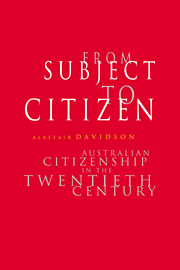Book contents
- Frontmatter
- Contents
- List of Figures
- List of Tables
- Acknowledgments
- Abbreviations
- Introduction
- PART I From Subject to Citizen 1901–1996
- 1 Civis Romanus Sum
- 2 From Subject to Citizen I: to 1948
- 3 Nationality and the Citizen II: 1948–1986
- 4 From Subject to Citizen III: 1983–1996
- Part II Discourses of Exclusion
- Part III The Active Citizen and Beyond
- Conclusion
- Notes
- Select Bibliography
- Index
4 - From Subject to Citizen III: 1983–1996
Published online by Cambridge University Press: 06 January 2010
- Frontmatter
- Contents
- List of Figures
- List of Tables
- Acknowledgments
- Abbreviations
- Introduction
- PART I From Subject to Citizen 1901–1996
- 1 Civis Romanus Sum
- 2 From Subject to Citizen I: to 1948
- 3 Nationality and the Citizen II: 1948–1986
- 4 From Subject to Citizen III: 1983–1996
- Part II Discourses of Exclusion
- Part III The Active Citizen and Beyond
- Conclusion
- Notes
- Select Bibliography
- Index
Summary
I pledge my loyalty to Australia and its people, whose democratic beliefs I share, whose rights and liberties I respect, and whose laws I will uphold and obey.
Oath of Australian Citizenship, 1994.By 1983 the future agenda for citizenship in Australia should have been clear to both the Australian people and their political parties. A new social compact based on an active democratic citizenship was needed. A huge immigration – most of it to build Australia economically – had made Australia a multicultural society. Both sides of politics acknowledged this, although the conservatives were more begrudging than were the progressives about the implications of that reality. The very people who encompassed the downfall of the Whitlam government in 1975 had committed themselves to multiculturalism, and a number of inquiries and commissions, notably that chaired by Frank Galbally in 1978, had led to innovations and legislation which officially recognised that Australia was a multicultural society. This still remained limited to a readiness to foster ‘cultural’ diversity.
The effect of being a society with over a hundred ethnic groups and eighty languages – a society of diversity and difference – was clear. The basically homogeneous social and cultural Australia of the first half of the twentieth century meant an Australia where there was often agreement about basic values held in common. The result had been a low level of conflict about what was the good and less need to manage difference – at least until the 1930s. Concretely, this meant that the issue of rights, as such, had not arisen as most people agreed on what was acceptable and much was decided in the private realm, without recourse to the state.
- Type
- Chapter
- Information
- From Subject to CitizenAustralian Citizenship in the Twentieth Century, pp. 113 - 142Publisher: Cambridge University PressPrint publication year: 1997



